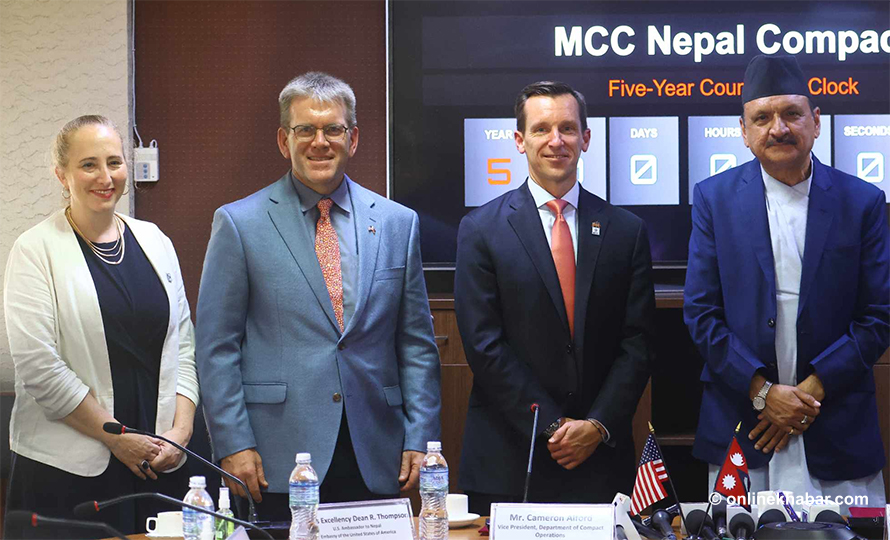
[ad_1]
August 5, Kathmandu. The MCC-funded project is about to be implemented (taken effect) for one year. The MCC was implemented on August 29 last year (August 13).
At an event hosted by the MCA Nepal and the U.S. Embassy on the first anniversary of the project, participants expressed concerns about whether the project could be completed within the required five years, if not, to recover the remaining subsidy amount given by MCC.
However, even after a year, the contract for the transmission line, the most important project to be built with the grant, has not yet been awarded. Of the 315-kilometer transmission line, the contractor for the 18-kilometer cross-border line has been selected and MCA Nepal is preparing to sign the contract soon. However, new bidding for the remaining 297 kilometers of the line has not yet been opened.
Likewise, much of the land needed for the project has yet to be acquired, raising concerns that implementation will be delayed and grants returned.
However, US Ambassador Dean Thomson said he was confident the project would be completed on time and the US grant would be fully spent. “This project has the support of the governments of Nepal and it has been declared a national pride project,” he said.
He said Nepal’s contribution to MCC projects on behalf of the government was the highest in the world. “If a disaster like Covid-19 or an earthquake occurs, it will be a different story, but if it does not happen, the work will be completed on time,” he said.

He said that the progress of the MCC project in the past year was very enthusiastic. He said that we are excited about what has happened in this year, but the commitment and legacy of the United States’ support to Nepal is long-term. In the past, we have supported organizations such as USAID and Piscore, and MCC is a continuation of this support. The United States will continue to support Nepal in the coming days. “
Likewise, MCC Resident Director Diane L. Francisco said there is no doubt that the project will be completed on time.
She said she spent a lot of time in the preparation stage to ensure there would be no problems when work started at the project site tomorrow. “We have made progress with the people on issues such as land acquisition and reducing social and environmental impacts. If people are happy in the process, they will help with the work tomorrow,” she said.
She said that the United States provided $500 million in aid to benefit the people of Nepal, and they knew that the people should also be happy after the aid was implemented.
“There shouldn’t be a situation where the United States is willing to cooperate but the people are unhappy. When that happens, we emphasize dialogue and consensus with the people,” she said.
She said the MCC projects had indeed gained strong momentum over the past year. “The contract agreements for the three substation projects have been signed, technical support to SERC has been finalized, the MCA partner program for the affected projects has been initiated, and the contract agreement for the 18km cross-border transmission line project is being finalized,” she said. Clear progress has been made.
He said that while the goals of the MCC project were ambitious and infrastructure projects had their own challenges, he was encouraged by the commitment of all stakeholders.
Similarly, MCA Nepal executive director Khadga Bahadur Bista said the contract agreement for the 297-km transmission project will be completed by 2024. He said the compensation for land acquisition in the seven districts has been determined. Similarly, he said the number of trees to be cut for the project has also been calculated. “It is understood that 47,000 trees will need to be cut in the project area and the government has also provided 400 hectares of land for planting, so work will also begin,” he said.
He also disclosed that the Environmental Impact Assessment (IEE) for the MCC road project has been approved.
Although land acquisition for the project is a difficult task, he is confident that it can be completed. “It is not necessary to acquire all the land at once, but it can be done in stages. Therefore, we believe there will be no problem in land acquisition.”
He said MCA Nepal is aware of the timeline of the MCC project. “We have already started planning how to implement the project in five years and how to hand it over successfully,” he said.
Is there any micro-management by MCC in the project?
Diane L. Francisco, MCC’s resident country director, did not deny that some government officials complained that MCC micromanaged MCC projects, making it difficult for them to work independently. Instead, she said it was done to ensure that the projects MCC implemented were of the highest quality.
“We don’t want any compromise in the quality of this project so that we can achieve the quality that we micro-manage,” she said. However, he said that MCC’s work has not been delayed because of this. He also said that they are expanding their relationship with the masses so that there will be no problems in the project work.
Responding to the same question, US Ambassador Dean Thomson said that this should be seen as cooperation rather than micromanagement. “There is no micromanagement by the United States, this is cooperation between the two countries, Nepal’s financial contribution to the project is also very large, Nepal also took effect earlier than other countries, so cooperation between the two countries is important for the implementation of the project,” Ambassador Thomson said.
[ad_2]
Source link


